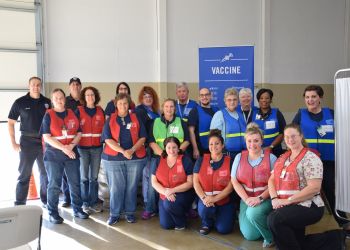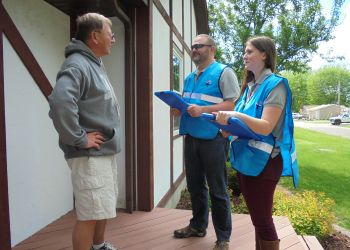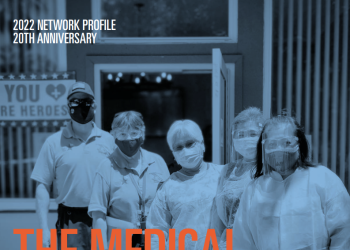MRC Deployment Readiness Resources
Through a cooperative agreement with the Administration for Strategic Preparedness and Response (ASPR), NACCHO ensures MRC units are positioned to support public health and emergency responses in their local communities.
The MRC Deployment Readiness Guides provide a common set of tools for MRC unit leaders to develop the capabilities of their MRC volunteers to support medical and public health emergency responses. The tools included in the guides provide recommended standards that can be modified to fit the unique mission of individual MRC units. These standards can also be shared with emergency response partners to demonstrate the capabilities of MRC volunteers.
NACCHO is pleased to announce the launch of the 2021 MRC Deployment Readiness Guide. This new version contains the most up-to-date information and resources pertaining to volunteer management and training standards in an effort to support MRC unit leaders in developing the capabilities of their MRC volunteers. The guide features updated deployment checklists, training resources, and 30 examples of Mission Sets that plan for missions ranging from COVID-19 response to volunteer coordination.
This work was made possible by the Department of Health and Human Services, Assistant Secretary for Preparedness and Response under cooperative agreement #5 HITEP200045-02-00, NACCHO's MRC Advisory Workgroup, as well as countless volunteers and unit leaders around the country.
2021 Deployment Readiness Guide
The 2021 MRC Deployment Readiness Guide builds on the work of the 2019 Guide and features an updated suite of deployment readiness information and resources for MRC unit leaders and volunteers including the following:
- Updated volunteer tier level recommendations
- Deployment readiness checklists including for a new "rapid deployment" phase
- Updated MRC Volunteer Core Competency Training Plan
- 16 new Mission Sets on COVID-19 response missions
2021 MRC Deployment Workshop
NACCHO conducted an MRC Deployment Workshop during the 2021 Preparedness Summit which was presented virtually on April 12. The goal of the MRC Deployment Workshop was to identify MRC volunteer deployment barriers, critical workforce roles, factors contributing to deployment barriers, successes that can be expanded across the network, and resources required to address barriers and future solutions.
In the report, available here, NACCHO captured inputs from the group, as well as their identification of top priorities and key takeaways. Their input included areas of success and challenges, which NACCHO categorized by different identified themes. Finally, NACCHO examined these inputs and developed supporting recommendations to maintain the successes or actions needed to address the challenges.
2019 Deployment Readiness Guide
The 2019 MRC Deployment Readiness Guide was the first iteration of a comprehensive guide aimed at increasing MRC units' deployment readiness. It features a suite of deployment readiness resources for MRC unit leaders and volunteers including the following:
- Volunteer tier level recommendations
- Deployment readiness checklists for unit leaders
- MRC Volunteer Core Competency Training Plan
- MRC Volunteer Deployment Readiness e-Learnings
- Mission Sets
NACCHO appreciates the contributions received to develop these resources and recognizes members of the NACCHO MRC Advisory Group and seven MRC units that served as pilot sites for the NACCHO MRC Deployment Readiness project. For more information on the pilot sites project, see the MRC Deployment-Ready Pilot Site Project Fact Sheet
NACCHO is pleased to present an online training series designed to support both experienced and new MRC unit leaders across the network. The series is intended for unit leaders, volunteers serving in a leadership role, and others that are engaged in the planning, development, and execution of an MRC unit. The courses, now live on MRC TRAIN, provide resources and recommendations that build upon the MRC Program Office's MRC Unit Factors for Success through addressing the following foundational topics:
- Unit Leader Responsibilities and Resources - MRC-TRAIN 1102996 - This course reviews MRC unit leaders’ overall responsibilities and provides resources to help them succeed including the MRC Unit Factors for Success, MRC listservs, New Leader Orientation, MRC Unit Profile & Activity Reporting System, Technical Assistance Assessments, the MRC Deployment Readiness Guide, volunteer management tools, Mission Sets, and MRC TRAIN.
- Developing Unit Leadership - MRC-TRAIN 1101198 - This course guides MRC unit leaders through structural development, organization, and risk management implementation of units by outlining how to understand the community they serve, develop a mission statement, determine goals and objectives, develop and implement risk management strategies, and plan and conduct non-emergency activities and events.
- Developing Unit Training Plans - MRC-TRAIN 1101199 - This course will help unit leaders who oversee the planning, development, and execution of an MRC unit's training plan. The course walks learners through conducting a needs assessment and training audit, identifying training resources, understanding the types of training formats and training best practices, incorporating partner agencies, and evaluating training programs.
- Volunteer Management - MRC-TRAIN 1101321 - This course guides unit leaders in determining unit composition; creating job action sheets and job descriptions; developing procedures for volunteer recruitment, retention, and recognition; creating a communication plan; and understanding CDC’s Public Health Emergency Preparedness and Response (PHEP)
Capability 15.
- Developing Unit Administrative Requirements - MRC-TRAIN 1102994 - This course promotes common standards for MRC unit administration policies and procedures and provides information on how a unit can incorporate these tools and resources into a strategic plan or roadmap. The course provides step-by-step instructions on determining financial needs, identifying funding sources, writing grant proposals, planning for financial sustainability, developing policies and procedures for unit administration, creating demobilization procedures, and developing and implementing a strategic plan or a road map.
- Building Community Partnerships - MRC-TRAIN 1102995 - This course provides tools and resources to assist unit leaders in establishing and maintaining partnerships and affiliations with community partners by walking through the different types of partnerships and the partnership continuum, identifying and analyzing stakeholders, applying Adaptive Leadership theory, and maintaining partnerships.
Access the courses by clicking on the hyperlinks above or by visiting train.org/mrc/home and searching "MRC Unit Leader Training." A one-page flyer on the series can be downloaded here.
To support MRC volunteer management, NACCHO developed a recommended Volunteer Tier Level Structure and a series of Deployment Readiness Checklists for Unit Leaders:
- Volunteer Tier Level Structure - The MRC volunteer tier levels were developed to identify national standards for MRC volunteers based on emergency response training and experience. This tiered structure is adapted from an original structure developed for Virginia MRC units and can be modified based on your unit's needs. Find the full MRC tier structure on page 8 of the 2021 Deployment Readiness Guide.
- MRC Unit Leader Deployment Readiness Checklists - These checklists cover the below four phases of deployment, including a new rapid deployment phase, and feature non-exhaustive yet comprehensive lists of deployment activities including administration, training, equipment, response operations, and medical/safety activities. Examples and resources are also listed throughout. Find the deployment readiness checklists on page 9 of the 2021 Deployment Readiness Guide.
- Pre-Deployment Phase
- Deployment Phase
- Rapid Deployment Phase
- Post-Deployment Phase
NACCHO, in collaboration with the MRC Program, developed a competency set for MRC Volunteers based on the Competencies for Disaster Medicine and Public Health (DMPH).
The DMPH Competencies are designed specifically for disaster and public health preparedness, response, and management. They are widely understood to define the knowledge and skills needed for healthcare professionals and first responders to perform a task in a safe and consistent manner.
Learn about the MRC Core Competencies for MRC volunteers and resources available to implement a training plan:
- About MRC Core Competencies
- MRC Core Competencies Training Plan
- The MRC Core Competencies Volunteer Training Plan is available on MRC TRAIN here.
- You can also create your own Training Plan on MRC TRAIN by following this Training Plan Guide.
- The MRC Core Competencies Volunteer Training Plan is available on MRC TRAIN here.
NACCHO has also developed two MRC Volunteer eLearning courses for MRC volunteers to develop foundational knowledge of what to expect before, during, and after deployments. Visit NACCHO University or MRC TRAIN to access the courses from your laptop or mobile device.
- Pre-deployment (MRC-TRAIN 1086867)
- Deployment/Post-deployment (MRC-TRAIN 1086868)
To support unit capability development, NACCHO developed MRC Mission Sets.
The term ‘Mission Set’ describes a scalable response and recovery capability for MRC units and volunteers that is organized, developed, trained, and exercised prior to an emergency or disaster for local, state, and/or regional deployment purposes. NACCHO's Mission Set Template is available to download here. The Mission Sets below were originally featured in either the 2021 or 2019 Deployment Readiness Guides and are intended to serve as examples that can be adapted based on local or state mission requirements.
| 2021 Deployment Readiness Guide | 2019 Deployment Readiness Guide |
|---|---|
| Points of Dispensing (PODs): |
Sheltering Operations: |
| Medical Surge: |
Alternate Care Sites (ACS)/ Medical Surge:
|
| COVID-19 Testing: |
Community Reception Centers (CRC): |
| Targeted Outreach: |
Community Rehabilitation: |
| Risk Communications: |
Emergency Auxiliary Communications: |
| Personal Protective Equipment (PPE) Fit Testing: | Volunteer Coordination: |
| Animal Response: |
Public Health Preparedness Program
Katherine Deffer
Director of Preparedness
JavaScript is required to reveal this message. / Email
Public Health Preparedness Program
Lean Abdelaziz
Senior Program Analyst, Preparedness
JavaScript is required to reveal this message. / Email
Public Health Preparedness Program
Beth Hess
Senior Communications Specialist
JavaScript is required to reveal this message. / Email
Public Health Preparedness Program
Khusbu Patel
Program Analyst, MRC
JavaScript is required to reveal this message. / Email


